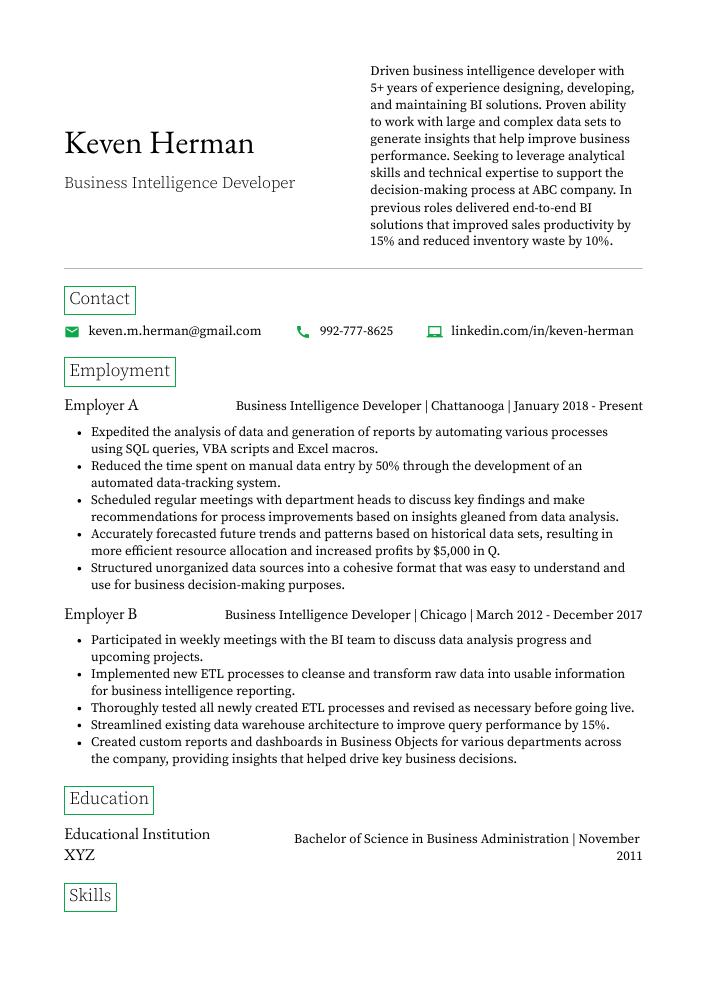Business Intelligence Developer Resume Guide
Business intelligence developers collect data from various sources and then use that data to develop business intelligence solutions. They also work with clients to understand their needs and create custom solutions that meet them. In addition, they provide support and training to users of the business intelligence solutions they develop.
You know how to develop the business intelligence tools that help organizations make data-driven decisions. But your potential employers don’t know who you are or what you can do. So you need to write a resume introducing them to your skills and experience.
This guide will walk you through the entire process of creating a top-notch resume. We first show you a complete example and then break down what each resume section should look like.
Table of Contents
The guide is divided into sections for your convenience. You can read it from beginning to end or use the table of contents below to jump to a specific part.
Business Intelligence Developer Resume Sample
Maye Morar
Business Intelligence Developer
[email protected]
876-441-7189
linkedin.com/in/maye-morar
Summary
Driven business intelligence developer with 5+ years of experience designing, developing, and maintaining BI solutions. Proven ability to work with large and complex data sets to generate insights that help improve business performance. Seeking to leverage analytical skills and technical expertise to support the decision-making process at ABC company. In previous roles delivered end-to-end BI solutions that improved sales productivity by 15% and reduced inventory waste by 10%.
Experience
Business Intelligence Developer, Employer A
Irvine, Jan 2018 – Present
- Expedited the analysis of data and generation of reports by automating various processes using SQL queries, VBA scripts and Excel macros.
- Reduced the time spent on manual data entry by 50% through the development of an automated data-tracking system.
- Scheduled regular meetings with department heads to discuss key findings and make recommendations for process improvements based on insights gleaned from data analysis.
- Accurately forecasted future trends and patterns based on historical data sets, resulting in more efficient resource allocation and increased profits.
- Structured unorganized data sources into a cohesive format that was easy to understand and use for business decision-making purposes.
Business Intelligence Developer, Employer B
Lincoln, Mar 2012 – Dec 2017
- Participated in weekly meetings with the BI team to discuss data analysis progress and upcoming projects.
- Implemented new ETL processes to cleanse and transform raw data into usable information for business intelligence reporting.
- Thoroughly tested all newly created ETL processes and revised as necessary before going live.
- Streamlined existing data warehouse architecture to improve query performance by 15%.
- Created custom reports and dashboards in BusinessObjects for various departments across the company, providing insights that helped drive key business decisions.
Skills
- SQL
- Microsoft SQL Server
- Business Intelligence
- Data Analysis
- Databases
- Business Analysis
- Data Warehousing
- Tableau
- HTML
Education
Bachelor of Science in Business Administration
Educational Institution XYZ
Nov 2011
Certifications
SAS Certified Business Intelligence Professional
SAS Institute
May 2017
1. Summary / Objective
A resume summary or objective is like a teaser for the rest of your resume – it should provide the employer with essential information about who you are and what you bring to the table as a business intelligence developer. Some things you could mention in your summary include your experience working with various BI tools, your ability to develop actionable insights from data, and how you have helped organizations improve their decision-making processes.
Below are some resume summary examples:
Energetic business intelligence developer with 5+ years of experience in designing, developing, and deploying BI solutions. Demonstrated expertise in data analysis, ETL/ELT processes, and report & dashboard development using MSBI tools – SSIS, SSAS & SSRS. At ABC Corp., improved data accuracy by 15% and decreased the time needed for reporting by 20%. Actively seeking an opportunity to leverage my skills and knowledge to help XYZ Corp. achieve its business goals.
Committed business intelligence developer with 4+ years of experience in the field. Proven ability to develop high-quality BI solutions, including dashboards, reporting, and data analysis. Seeking to leverage my skill set and BI development experience at ABC Company to contribute to business success. At previous positions increased accuracy of forecasting by 17% and improved efficiency of KPI monitoring by 13%.
Professional business intelligence developer with experience in building data warehouses and developing ETL processes. Seeking to use expertise in SQL, Tableau, and QlikView to become the next business intelligence developer at ABC. At previous company, increased sales productivity by 15% through the development of an automated reporting system that delivered key insights to field sales reps on a daily basis.
Skilled Business Intelligence Developer with 6+ years of experience in data analysis and reporting. Proven ability to develop creative solutions to complex problems. Seeking to leverage analytical skills and business acumen to improve decision-making at ABC Corporation. At previous company, increased efficiency by 24% through the development of an automated report generation process.
Passionate business intelligence developer with 4+ years of experience in designing, developing, and deploying business intelligence solutions. Experienced in all stages of the software development cycle and skilled at working with various data visualization tools. Seeking to leverage my skills and knowledge to help ABC company make better data-driven decisions.
Dependable Business Intelligence Developer with 5+ years of experience in designing and implementing data warehouses, ETL processes, and OLAP cubes. At XYZ Corporation increased performance by 25% while reducing costs by $400,000 annually through the development of a new dimensional data model. Proven ability to work independently as well as part of a team.
Detail-oriented Business Intelligence Developer with 3 years of experience in designing and developing Business Intelligence solutions. At ABC, increased the efficiency of sales operations by 50% through the implementation of an innovative BI system. Seeking to leverage my skills and experience to help XYZ improve their decision-making processes.
Determined Business Intelligence Developer with experience in data analysis and SQL programming. At XYZ, increased the performance of 13 legacy reports by 85%. Recognized for the ability to develop creative solutions to solve complex business problems. Aiming to leverage my knowledge and experience to help ABC achieve its business goals.
2. Experience / Employment
In the experience/employment/work history section, you provide details about your job history. This should be written in reverse chronological order, which means that your most recent job is listed at the top.
When stating what you did in each role, use bullet points. This will make it easier for the reader to quickly understand what you want to say. You’ll also want to take some time to think about the specifics of what you did and any quantifiable results that were obtained.
For example, instead of saying “Developed business intelligence solutions,” you could say, “Created a data warehouse utilizing an ETL process and Tableau reporting tools, resulting in decreased decision-making time by 50%.”
To write effective bullet points, begin with a strong verb or adverb. Industry specific verbs to use are:
- Developed
- Implemented
- Refactored
- Tested
- Debugged
- Analyzed
- Created
- Designed
- Documented
- Maintained
- Monitored
- Optimized
- Scheduled
- Administered
- Troubleshot
Other general verbs you can use are:
- Achieved
- Advised
- Assessed
- Compiled
- Coordinated
- Demonstrated
- Expedited
- Facilitated
- Formulated
- Improved
- Introduced
- Mentored
- Participated
- Prepared
- Presented
- Reduced
- Reorganized
- Represented
- Revised
- Spearheaded
- Streamlined
- Structured
- Utilized
Below are some example bullet points:
- Presented daily, weekly and monthly reports on company performance to upper management, helping them to make informed decisions on where to allocate resources.
- Spearheaded the development of a new business intelligence platform that increased data processing speeds by 30%.
- Refactored existing SQL queries to improve performance and reduce run times by 15%.
- Reliably delivered accurate and timely reports despite working with large and complex data sets.
- Introduced innovative visualizations and dashboards that helped managers gain insights into key metrics more easily.
- Successfully implemented Business Intelligence solutions that drove $68,000 in annual cost savings.
- Administered a team of 6 analysts who delivered critical insights to business stakeholders on a daily basis.
- Utilized data mining, predictive analytics, and statistical modeling techniques to uncover hidden patterns and trends in large data sets.
- Tested and assessed new BI software platforms and tools before recommending them for enterprise-wide adoption.
- Assessed the impact of proposed changes to business processes on existing BI applications and systems.
- Represented the company in various data analytics conferences and events.
- Resourcefully developed new methods for data collection and analysis, resulting in a 10% increase in efficiency.
- Coordinated with different departments to ensure that data analytics goals are aligned with business objectives.
- Advised management on the best course of action based on findings from data analysis.
- Debugged issues in existing data models and created new ones as needed, increasing accuracy by 15%.
- Formulated and developed business intelligence solutions that substantially improved data analysis and decision-making processes for the company.
- Developed innovative dashboards and reports that facilitated a better understanding of complex data sets, resulting in more informed decision-making by management.
- Substantially reduced the time needed to generate monthly reports by automating key processes using SQL and Excel macros.
- Facilitated training sessions for new users of the business intelligence system, ensuring that they were able to effectively use the tools available to them.
- Troubleshot issues with the business intelligence system on an ongoing basis, quickly resolving any problems that arose so that users could continue to work uninterrupted.
- Improved business intelligence reporting by developing new data visualizations and dashboards.
- Prepared detailed documentation for all business intelligence reports and dashboards, including instructions on how to use them.
- Effectively communicated with various stakeholders to gather requirements and understand business needs.
- Reorganized the business intelligence team’s file structure, making it easier for others to find and use the reports and dashboards.
- Developed training materials for the business intelligence team, helping them to better understand the tools and techniques used.
- Mentored a team of 4 analysts in best practices for data mining, analysis and reporting; as a result, the team’s efficiency increased by 25%.
- Analyzed customer data to identify trends and patterns, which were then used to develop targeted marketing campaigns that generated an additional $1 million in revenue.
- Optimized existing ETL processes to load data into the data warehouse more quickly and efficiently; reduced processing time by 2 hours per day on average.
- Maintained up-to-date documentation of all business intelligence systems and processes; created user manuals and training materials for new staff members.
- Competently handled all aspects of project development life cycle, from requirement gathering to system testing & deployment; successfully delivered 12 projects on time & within budget over the course of 2 years.
- Monitored data trends and created weekly/monthly reports to show progress of KPIs for the company.
- Consistently delivered accurate insights that helped the company save $5,000 in operational costs last quarter.
- Achieved a 95% success rate when designing and implementing new data models for the business.
- Designed custom dashboards and visualizations that provided valuable insights into customer behavior patterns.
- Created a set of guidelines that improved data quality by 20%.
3. Skills
The skills required for a business intelligence developer vary depending on the company. However, some of the most common skills employers look for include experience with SQL, data mining, and analytics.
It is essential to tailor the skills section of your resume to each job you are applying for because many companies use applicant tracking systems these days, which scan resumes for specific keywords before passing them on to a human.
Once listed here, you can further elaborate on your skillset by discussing it in more detail in other areas of your resume – such as the summary or experience section.
Below is a list of common skills & terms:
- .NET
- ASP.NET
- Access
- Agile Methodologies
- Analysis
- Analytics
- Business Analysis
- Business Intelligence
- Business Intelligence Tools
- Business Objects
- Business Process Improvement
- C
- C#
- C++
- CSS
- Cognos
- Crystal Reports
- Dashboard
- Data Analysis
- Data Mining
- Data Modeling
- Data Visualization
- Data Warehousing
- Database Administration
- Database Design
- Databases
- ETL
- HTML
- Integration
- Java
- JavaScript
- Linux
- Microsoft Access
- Microsoft Power BI
- Microsoft SQL Server
- MySQL
- Oracle
- PHP
- PL/SQL
- Power BI
- Process Improvement
- Programming
- Python
- R
- Requirements Analysis
- Requirements Gathering
- SDLC
- SQL
- SQL Server Integration Services
- SQL Server Management Studio
- SQL Server Reporting Services
- SSIS
- SSRS
- SharePoint
- Software Development
- Software Development Life Cycle
- Software Documentation
- Statistics
- T SQL
- Tableau
- Team Leadership
- Teamwork
- Testing
- Time Management
- Transact SQL
- Troubleshooting
- Unix
- VBA
- Visio
- Visual Basic
- Visual Studio
- Web Development
- Windows
- XML
4. Education
Mentioning your education on your resume will depend on the level of experience you have. If this is your first job after graduation, or if you are early in your career, include an education section below your resume objective. However, if you have been working in the field for a while and have plenty of experience to showcase, there may be no need to include an education section.
If you do mention your education, highlight any coursework or projects that were related to business intelligence development. For example, “Courses included Business Intelligence Tools & Techniques, Database Management Systems and Data Mining.”
Bachelor of Science in Business Administration
Educational Institution XYZ
Nov 2011
5. Certifications
Certifications allow you to prove to potential employers that you have the skills and knowledge required for a specific role. They also show that you are actively keeping your skills up-to-date, which is always impressive to hiring managers.
If you have any certifications related to business intelligence or data analytics, make sure to include them in this section of your resume. Doing so will give you a significant advantage over other candidates who do not have such credentials.
SAS Certified Business Intelligence Professional
SAS Institute
May 2017
6. Contact Info
Your name should be the first thing a reader sees when viewing your resume, so ensure its positioning is prominent. Your phone number should be written in the most commonly used format in your country/city/state, and your email address should be professional.
You can also choose to include a link to your LinkedIn profile, personal website, or other online platforms relevant to your industry.
Finally, name your resume file appropriately to help hiring managers; for Maye Morar, this would be Maye-Morar-resume.pdf or Maye-Morar-resume.docx.
7. Cover Letter
Providing a cover letter along with your resume gives you the opportunity to elaborate on your skills and experience, as well as explain why you would be the perfect fit for the role you’re applying for.
A cover letter is usually made up of 2 to 4 paragraphs, and should complement your resume rather than repeat what’s already been said. It’s a great way to give recruiters a more in-depth look at who you are as a professional and highlight any relevant experience or skills that make you the ideal candidate for the job.
Below is an example cover letter:
Dear Rodger,
I am writing in response to your posting for a Business Intelligence Developer. With experience designing and developing data warehouses, as well as creating ETL processes using SSIS, I am confident I will be an asset to your organization.
In my previous role, I was responsible for the entire business intelligence lifecycle for a large e-commerce company. This included requirements gathering, data modeling, dimensional design, ETL development, and report/dashboard creation. I also created a self-service reporting portal that allowed non-technical users to create their own reports without IT involvement.
The skills that have helped me be successful in my career so far are:
– Strong technical skills in SQL Server ( Including T-SQL, SSIS, and SSRS)
– Experience with data visualization tools such as Tableau and Power BI
– Ability to understand business requirements and translate them into technical specifications
– Excellent communication and interpersonal skills
I’ve attached my resume which contains additional information about my experience and projects. Feel free to contact me at [phone number] or [email address] if you have any questions or would like to schedule an interview. Thank you for your time!
Sincerely,
Maye
Business Intelligence Developer Resume Templates
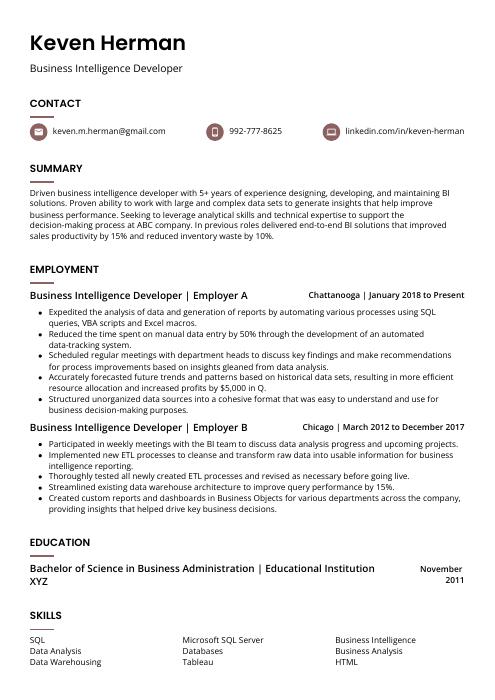 Fossa
Fossa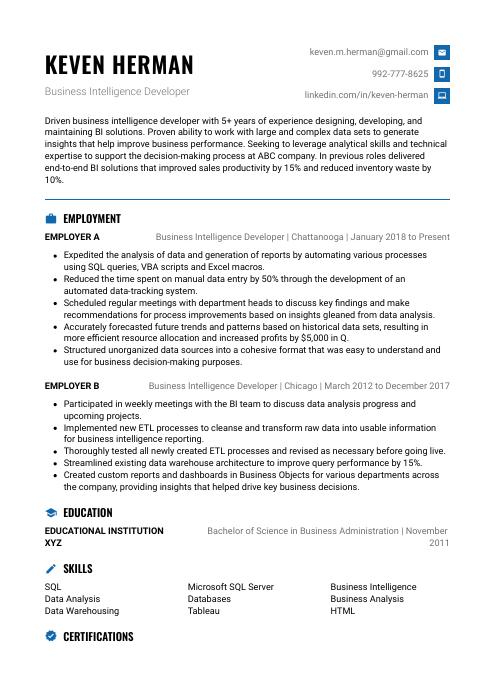 Echidna
Echidna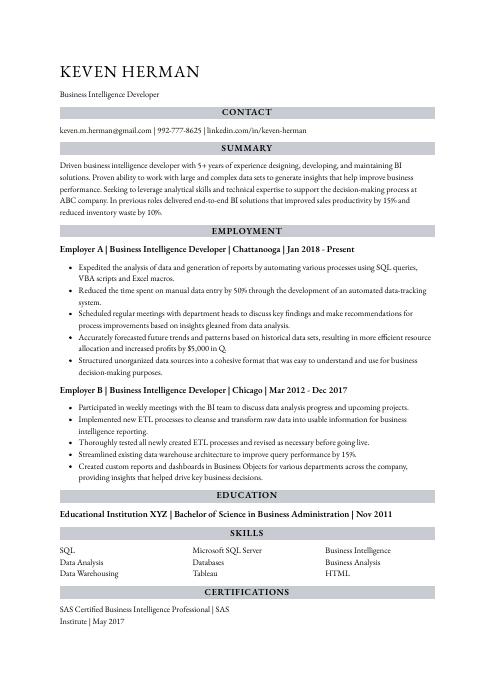 Numbat
Numbat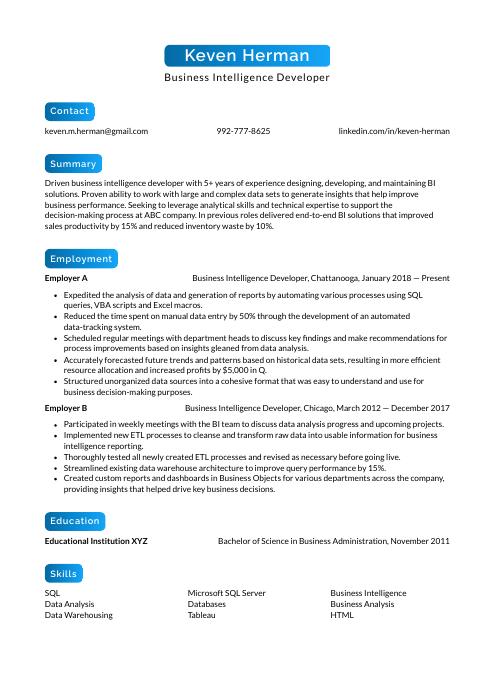 Kinkajou
Kinkajou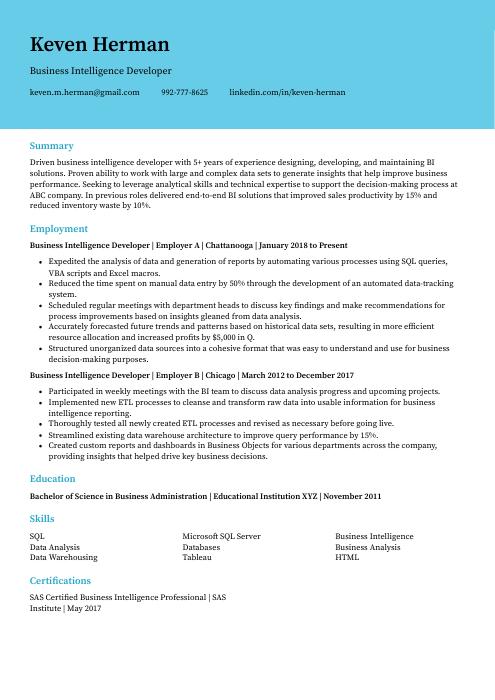 Dugong
Dugong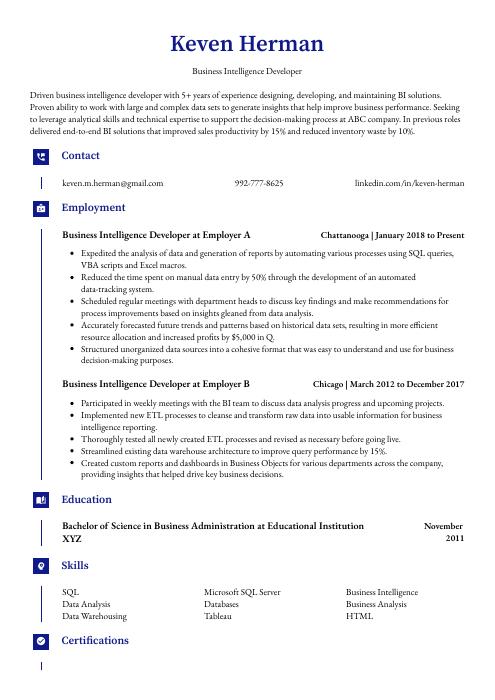 Gharial
Gharial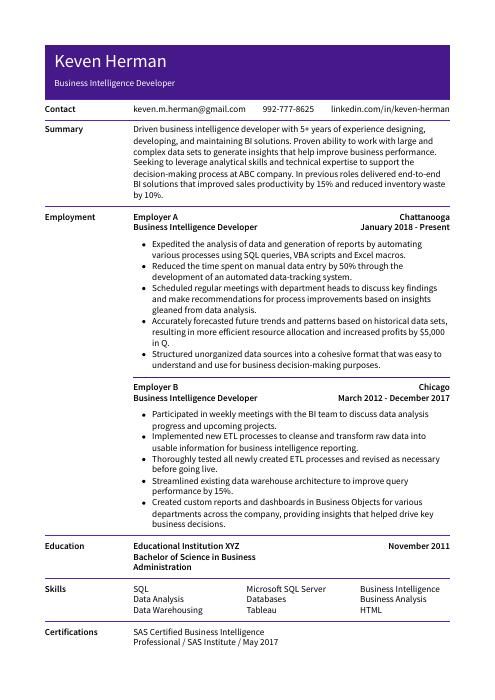 Pika
Pika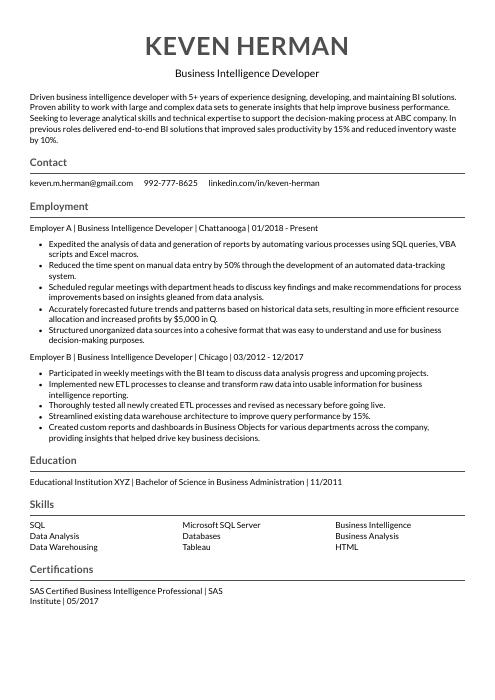 Indri
Indri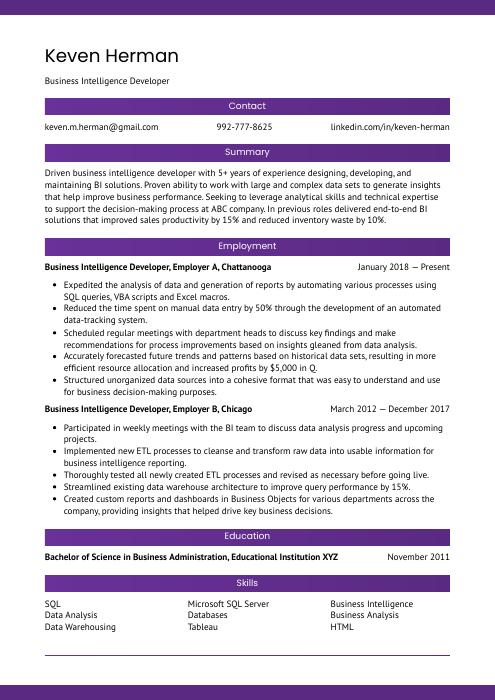 Jerboa
Jerboa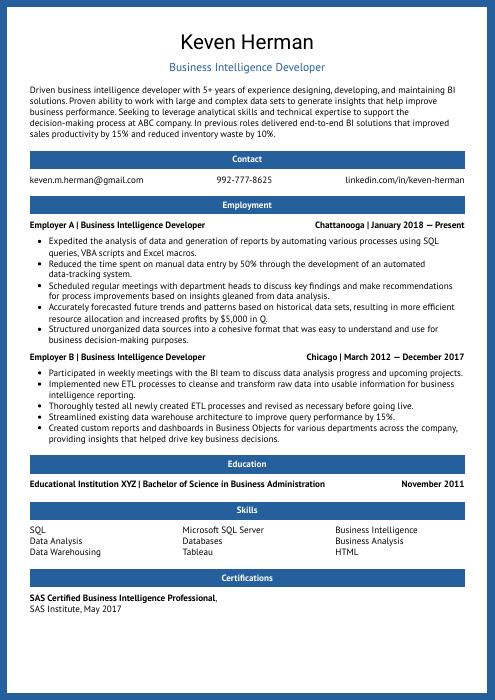 Ocelot
Ocelot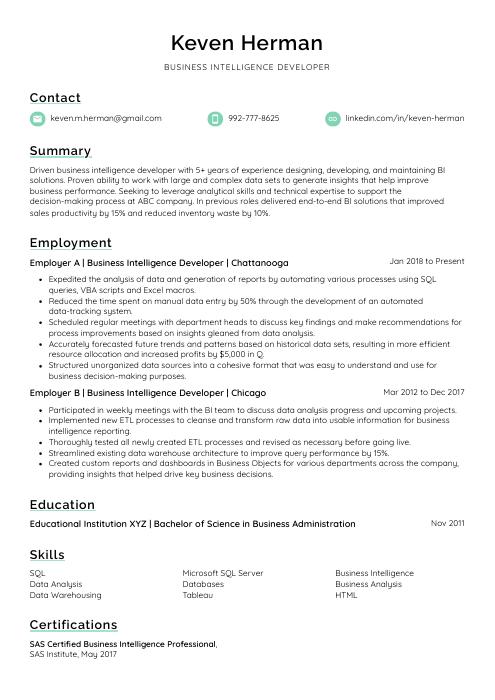 Lorikeet
Lorikeet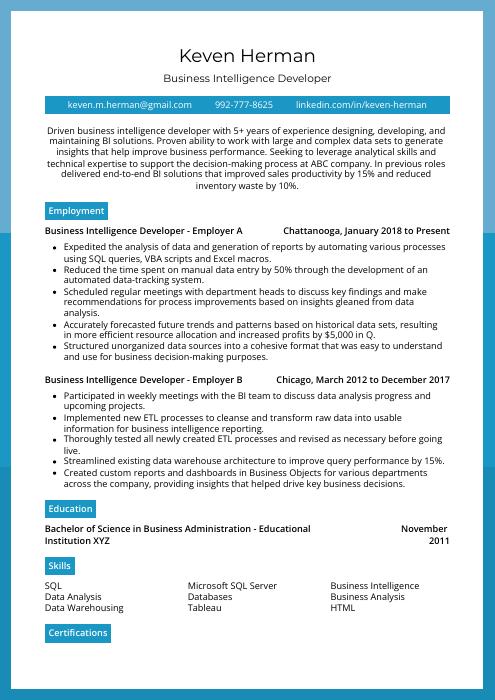 Rhea
Rhea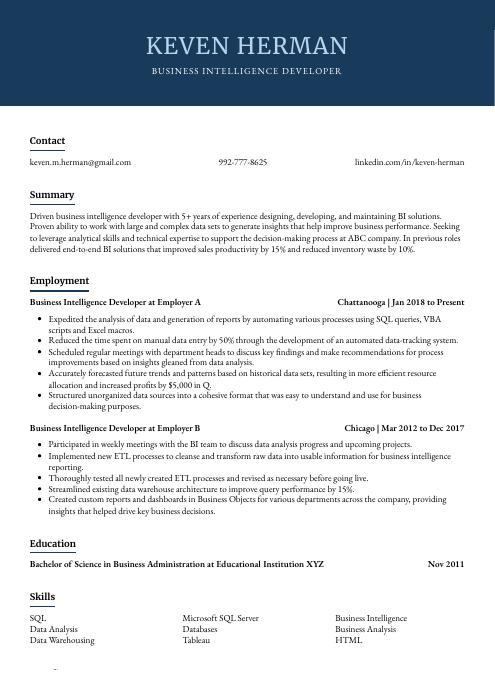 Bonobo
Bonobo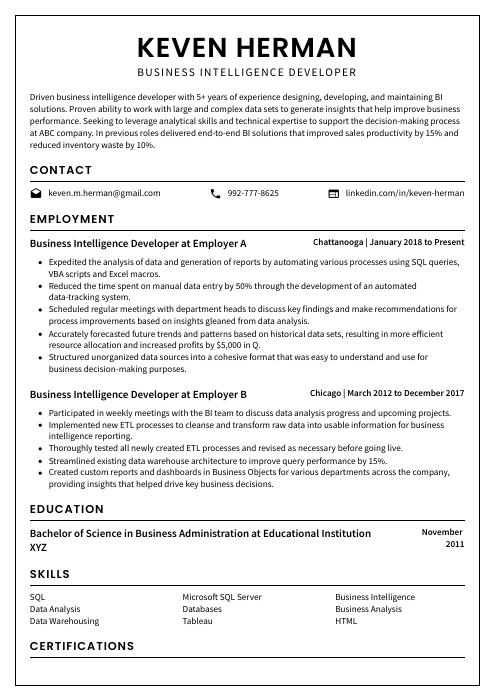 Cormorant
Cormorant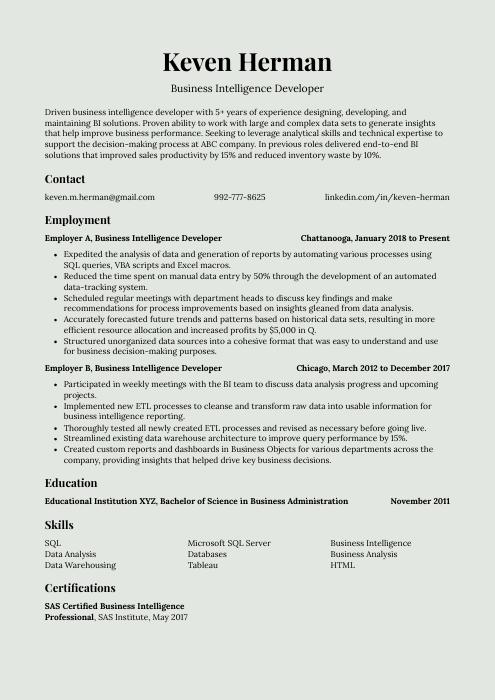 Saola
Saola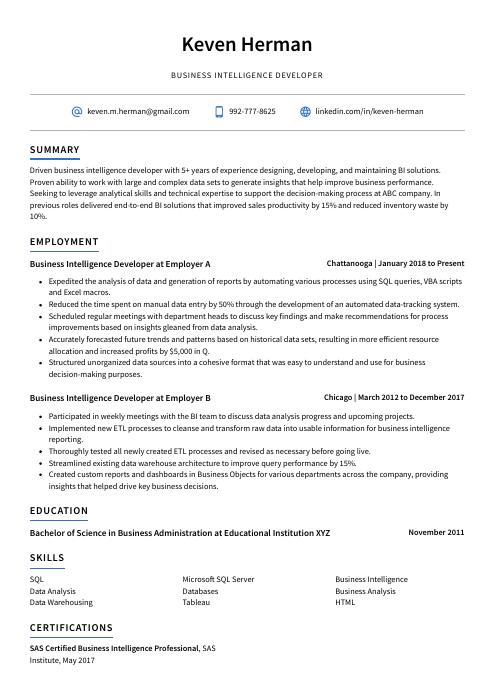 Axolotl
Axolotl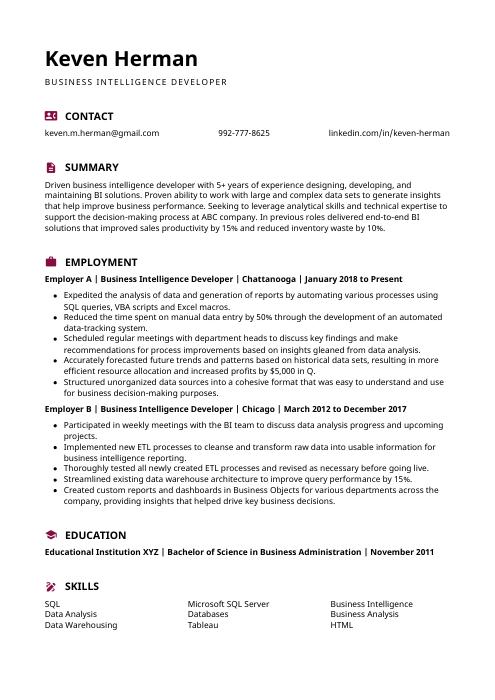 Hoopoe
Hoopoe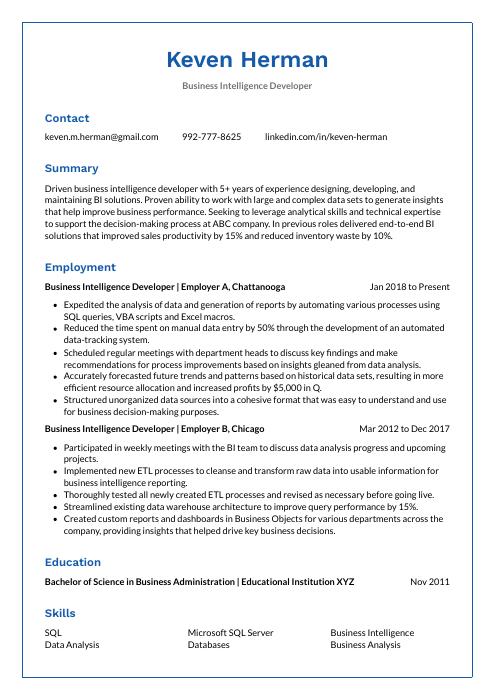 Markhor
Markhor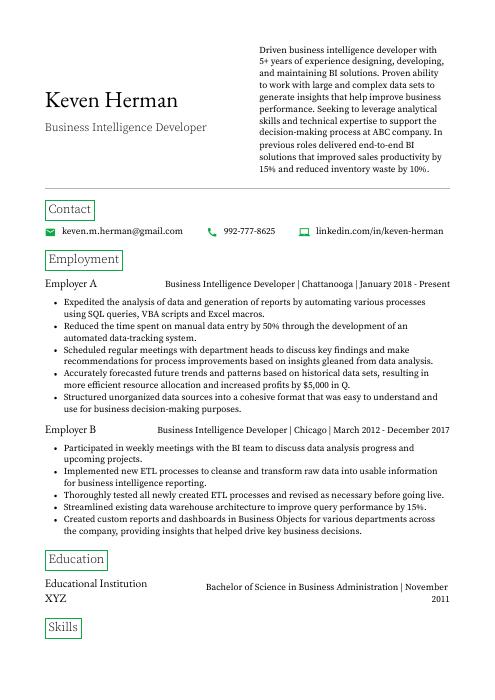 Quokka
Quokka Rezjumei
Rezjumei
